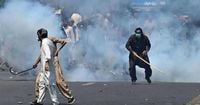On July 31, 2025, Pakistan’s Anti-Terrorism Court delivered a sweeping verdict that sentenced at least 108 members of former Prime Minister Imran Khan’s Pakistan Tehreek-e-Insaf (PTI) party to lengthy prison terms. These convictions stem from the defendants’ alleged involvement in violent protests against the military in May 2023, following Khan’s arrest on corruption charges. The court’s decision, which also disqualified six PTI lawmakers from their parliamentary seats, has sent shockwaves through Pakistan’s political landscape and sparked widespread condemnation from opposition figures and human rights observers alike.
The protests erupted after Khan’s detention on May 9, 2023, igniting a wave of unrest across the country. Thousands of PTI supporters stormed government buildings and military installations, including the local office of Pakistan’s premier intelligence agency, the Inter Services Intelligence (ISI). The clashes resulted in at least ten deaths and significant property damage. Authorities responded with a crackdown on PTI members, culminating in these recent mass convictions.
The Anti-Terrorism Court ruled that the cases against the defendants were proven “without a shadow of doubt,” citing coordinated conspiracy, direct participation in acts of violence, sieges of military offices, and destruction of public property. Among those sentenced were high-profile political figures such as Omer Ayub Khan, leader of the opposition in the National Assembly and grandson of former President Field Marshal Ayub Khan, who received a 30-year sentence. Senator Shibli Faraz, opposition leader in the Senate and former federal minister of science and technology, was also sentenced to 30 years. Other prominent names included Zartaj Gul, Kanwal Shauzab, and Junaid Afzal Sahi. Additionally, Sahibzada Hamid Raza, an Islamic scholar and chairman of the Sunni Ittehad Council, was handed a 10-year prison term.
All those given hefty jail sentences belong to PTI, which remains the largest opposition party in both chambers of Pakistan’s federal parliament. However, 77 accused, including former Information Minister Fawad Chaudhry and Zain Qureshi—the son of incarcerated former Foreign Minister Shah Mahmood Qureshi—were acquitted due to insufficient evidence.
The verdicts mark the third major ruling by the Anti-Terrorism Court this month, following earlier convictions of dozens of PTI parliamentarians and activists across Punjab province. The court’s decisions have profound political consequences: under Pakistani law, convicted parliamentarians automatically lose their seats, which drastically reduces PTI’s representation in the National Assembly and Senate.
PTI has denounced the rulings as politically motivated and an attempt by the military-led establishment to weaken the party ahead of planned rallies on August 5, 2025, commemorating the anniversary of Khan’s imprisonment. The party’s official X account stated, “For the first time in Pakistan’s judicial history, such a sad and shameful incident occurred that the leaders of the opposition in both houses [of parliament] were punished solely on the basis that they were loyal allies of Imran Khan’s political narrative, public representation, and constitutional struggle.”
Khan’s media adviser, Zulfi Bukhari, described the convictions as “a black day for democracy,” warning that punishing opposition figures one after another “does not bode well for any democratic system and will seriously damage our already fragile democracy.” The PTI has announced plans to file appeals promptly and has hinted at boycotting the National Assembly or organizing large-scale protests in response to the verdicts.
Imran Khan, a former international cricket star turned politician, has been imprisoned in Rawalpindi since August 2023 after being sentenced to 14 years on corruption charges. He faces more than 150 other legal cases, including accusations ranging from terrorism to leaking state secrets, which he and his supporters claim are politically motivated efforts to silence him. Despite his incarceration, Khan remains an immensely popular figure in Pakistan, with his supporters continuing to rally for his release both domestically and internationally.
The Human Rights Commission of Pakistan (HRCP) expressed grave concern over the timing and scale of the convictions, warning that such mass rulings risk eroding the credibility of Pakistan’s judiciary. The HRCP’s caution comes amid growing scrutiny from international media and human rights observers who monitor press freedom and judicial independence in the country.
Internationally, protests have erupted in Western capitals like London and Washington, where members of the Pakistani diaspora have called for increased pressure on Pakistan’s government to release Khan and uphold democratic norms. These developments underscore the global resonance of Pakistan’s internal political struggles and the contentious role of its military in shaping the nation’s governance.
Pakistan’s Anti-Terrorism Court was originally established in 1997 under Nawaz Sharif’s government to handle terrorism-related cases. The current government is led by Nawaz’s brother, Shehbaz Sharif, raising questions about the political motivations behind the court’s recent rulings against PTI, which has long accused the military and ruling establishment of orchestrating a campaign to suppress opposition voices.
The arrests, prosecutions, and convictions of PTI members reflect the deepening polarization in Pakistan’s politics, where the military’s influence remains pervasive. The court’s decisions not only strip PTI of key parliamentary figures but also threaten to reshape the balance of power ahead of future elections.
As Pakistan grapples with these developments, the nation stands at a crossroads. Will the judiciary maintain its independence, or will it continue to be perceived as an instrument of political suppression? The coming weeks and months will be critical, as PTI’s response to these verdicts and the government’s handling of dissent will shape Pakistan’s democratic trajectory.
For now, the conviction of over a hundred PTI members marks a significant, if controversial, chapter in Pakistan’s ongoing political saga—a saga where the lines between justice, politics, and power remain sharply contested.

